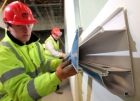Keeping knowledge of cable containment up to date

Selecting and specifying cable-management systems requires up-to-date knowledge of the capacities of systems and the requirements of a project. Manufacturers have a key role to play stresses Steve Davis of Marco Cable Management.
Storage capacity and bandwidth are no longer the sole primary factors for specifiers and contractors when selecting the right cable-management solution. The wider environment, longevity and future functionality are other factors that are merging as differentiators when choosing a specification. Cable containment forms only one element of a broader installation package, so how can contractors and specifiers make a truly considered choice when there are so many other elements needed be taken into account?
Essentially It is the role of the manufacturer to provide the solutions.
Traditionally, cable-management systems had offered little choice and flexibility. A one-size-fits-all ethos was generally accepted, and contractors were tasked with ensuring the system could cope with the chosen specification. As buildings and structures became increasingly more complex in makeup, designs needed to change and evolve. The products now available reflect these changes.
As a manufacturer, we assume a responsibility for educating customers, equipping them with the knowledge and understanding to make the right choice.
We were recently involved in a project at large hospital where the trust had an out-of-date uPVC trunking specification in place. By presenting an alternative with our Elite 3 uPVC data trunking, the hospital was able to achieve Cat 6a compliancy, as well as stopping the spread of bacteria by specifying our Hygeia range. Without this collaborative and supportive approach, our customer may have selected a system without the necessary performance, capability and suitability.
Our industry still needs to become more proactive and refuse to simply present the products and leave the rest up to our customers.
Education is critical, and we must use our resources to identify the best and most effective way of delivering the latest information. For example, all our sales team is fully acquainted with the latest technical standards and product choices, to ensure that the customer is being given all the available options to the best suit their particular needs. In addition, through our various media, online tools, product seminars, brochures and dedicated customer support, we must fully engage with all the potential influencers in the decision to specify data containment.
As stated earlier, the healthcare industry is an example where our customers are not always aware of the variety of solutions available that will enable them to meet stringent criteria enforced by hospital trusts. Controlling the spread of disease and infection in healthcare institutions is a top priority, and recent statistics show that some 10% of patients have some form of healthcare-acquired infection at any one time. With this in mind, how aware are our customers that products are available containing antimicrobial compound, offering added protection that is built within the very make up of our products?
We utilise silver-ion technology in the Hygeia range to create a defence against 99.9% of harmful bacteria growth. It provides built-in protection from, and prevents the growth of, bacteria, fungi, mildew and moulds, including MRSA, E-Coli and salmonella. By explaining how the application works and how the design has been developed to meet the challenges of a healthcare environment, our customers can support the end user in meeting their wider objectives.
Such a project is South Glasgow Hospital, where Mercury Engineering is currently carrying out the M&E Installation using thousands of metres of our Hygiea antimicrobial trunking has been specified. The client is NHS Scotland, and the £200 million contract has a schedule timeframe of 50 months.
Gavin Hanlon, electrical manager at Mercury Engineering explains:
‘This hospital, one of the most advanced medical facilities in the world, includes emergency-care centres, diagnostic units, cancer unit, specialist rehabilitation unit and renal dialysis. Due to the complex nature of this project Marco Cable Management will supply the Dado trunking system to suit Mercury Engineering’s exact requirements. Marco has developed a close working relationship with Mercury and has met their requirements by supplying the uPVC Elite Hygeia Dado Trunking.
‘Mercury learned about the product from previous Marco case studies and their success on other projects such as Coventry LIFT. After having looked at the success the product has had on the Coventry Hospital and other projects Mercury decided that it would be the most suitable product for the new Glasgow Hospital.
These trunking systems are used in environments where the spread of bacteria growth must be controlled, which was key factor to Mercury when considering modern-day hospital hygiene. Marco utilizes silver ion technology, to create a defence against 99.9% of harmful bacteria growth.
‘Mercury is very happy with the products that Marco supply, and Marco as an organisation is very good with both the communication and delivery of new products.’
Steve Davis is business development manager with Marco Cable Management.







